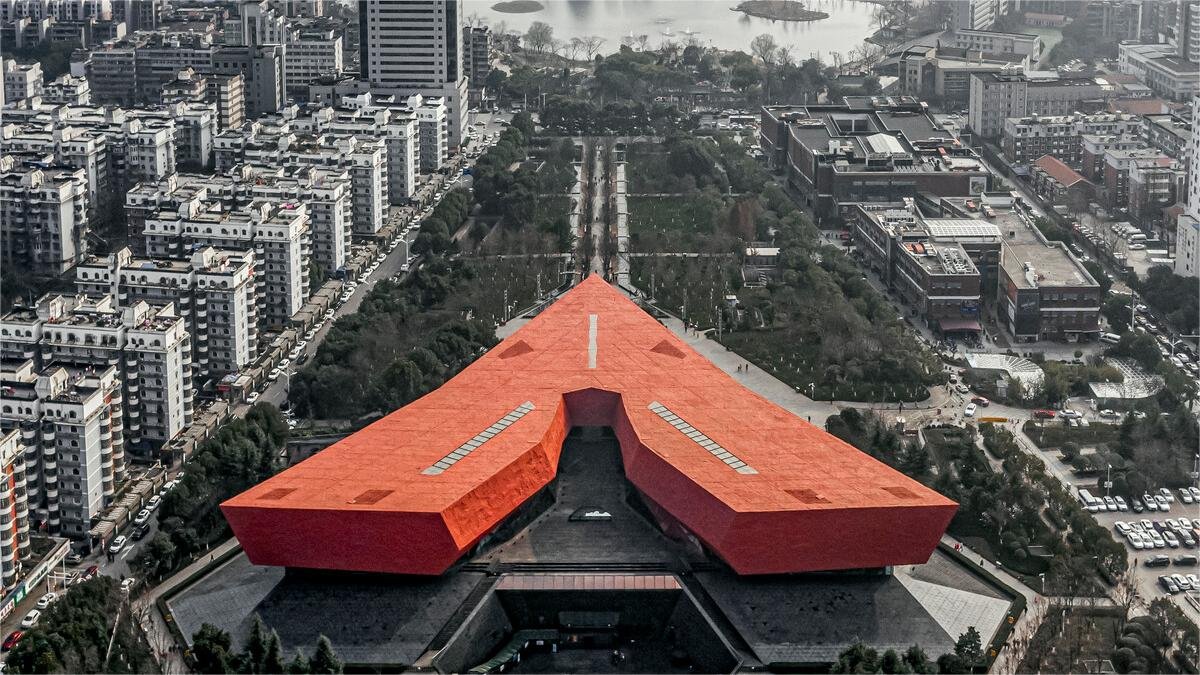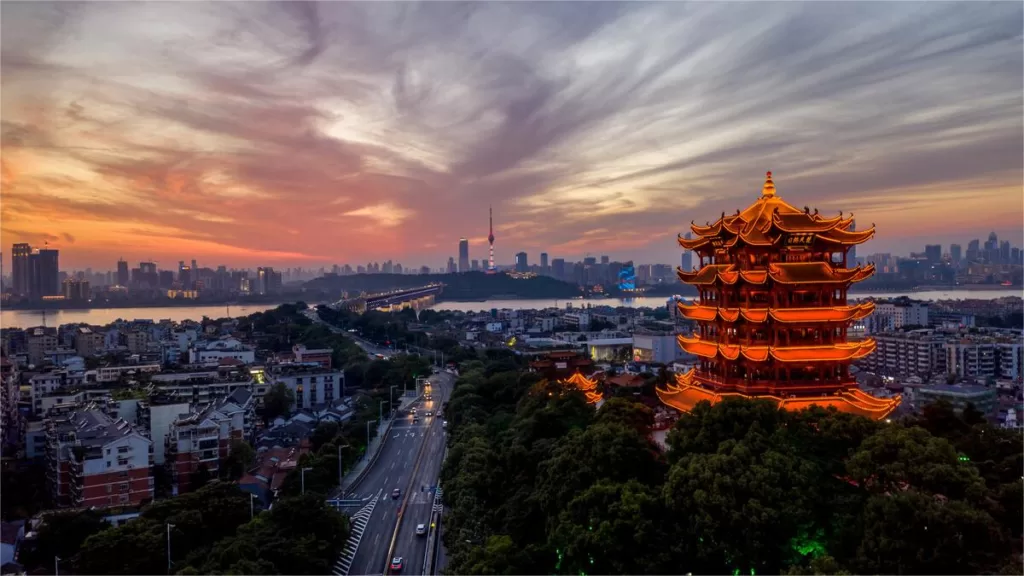The Xinhai Revolution Museum (辛亥革命博物馆), located on the southern side of Shouyi Square in Wuhan, is a specialized museum built to commemorate the 100th anniversary of the Xinhai Revolution and the Wuchang Uprising. The museum’s architectural design seamlessly blends traditional Chinese elements with modern features, forming an aerial view of a striking red “V” shape, symbolizing the pioneering spirit of the Wuchang Uprising and Wuhan’s progress.
This museum spans a total of four floors, with one underground level and three above ground. It comprises one introductory hall, five fundamental exhibition halls, and one multipurpose exhibition hall.
Exhibitions of Xinhai Revolution Museum
The main exhibit at the Xinhai Revolution Museum is the “Foundation of the Republic: Historical Display of the Xinhai Revolution.” This exhibit is divided into five sections: Late Qing China, the origins of the revolution, the Wuchang Uprising, the establishment of the republic, and the centenary of the Xinhai Revolution. Within these sections, the museum showcases an impressive collection of 428 historical artifacts and items, 694 historical photographs, 27 scenes reenacting significant historical events, 12 pieces of artwork, and 20 multimedia presentations.

Among the prominent artifacts on display are Sun Yat-sen‘s strategic map for founding the nation, membership certificates from the Shaanxi Alliance Society, bonds from the Qing Dynasty issued to European and American banks for railway construction, and postal issues from the Republic of China featuring “Huang Xing” on commemorative stamps.
The Xinhai Revolution Museum offers a comprehensive journey through the historical events and key figures of the Xinhai Revolution, shedding light on this pivotal period in Chinese history. Visitors can explore the exhibits to gain a deeper understanding of the revolution’s significance and the birth of the Republic of China. The museum not only preserves historical relics but also serves as a cultural and educational center, making it an essential destination for those interested in China’s revolutionary history and the spirit of the Wuchang Uprising.
Basic Information
| Website | https://1911museum.cn/ |
| Estimated Length of Tour | 1 – 2 hours |
| Ticket Price | Free |
| Opening Hours | 9.00 – 17.00; Last admission: 16.10 Closed on Mondays |
| Telephone Number | 0086-027-88051911 0086-027-88071911 |
Location and Transportation
The Xinhai Revolution Museum is situated at 258 Pengliuyang Road, Wuchang District, Wuhan City, Hubei Province, China. It occupies a prime location with Pengliuyang Road to the north, Zhangzhidong Road to the south, Chushan Street to the east, and Tiyu Street to the west. To get there, you can choose one of the following ways:
Bus: Take bus 10, 401, 411, 413, 504, 522, 554, 561, 728, or 806, get off at Pengliuyang Road Tiyu Street Stop (彭刘杨路体育街站), and walk about 400 meters to the south to reach the museum.
Metro: The closest metro station to Xinhai Revolution Museum is Fuxinglu (复兴路) on line 4 and line 5. After getting out of the station from Exit C2, walk about 300 meters to the east to reach the museum.
Vlog about Xinhai Revolution Museum
Useful Tips Summarized from Reviews
Split into Two Areas: The Xinhai Revolution Museum is divided into two areas: the North and South regions. If you’re short on time, it’s recommended to focus on the South Museum, which is better organized and provides a comprehensive overview of the historical context with many artifacts to observe. The use of sound, light, and multimedia aids enhances the overall viewing experience. The North area features the restored site of the former headquarters of the Wuhan Military Government. It primarily showcases calligraphy, photographs, and similar exhibits. If you have ample time, consider exploring both sections.
Distinctive Architecture: The architecture in the North area exudes a distinctly Republican-era style. During that period, Western influences were prevalent, evident in the arched doorways, deep brown flooring, door frames, and vintage-style desk lamps.
Highlight: Third Exhibition Hall: One of the most captivating sections is the third exhibition hall. Here, the museum recreates the scene of the overnight bloodshed during the eve of the Wuchang Uprising. Stepping into this hall feels like being transported back to the city of Wuchang in 1911. The immersive experience can be quite impactful, especially during your first visit.

















Reminder: There are 2 halls, the South Hall and the North Hall. The Red House is in the North Hall, where you can also see the Yellow Crane Tower. Almost missed one.
There are 4 free guided tours in a day, scheduled at 9:30, 10:30, 14:30, and 15:30 respectively.